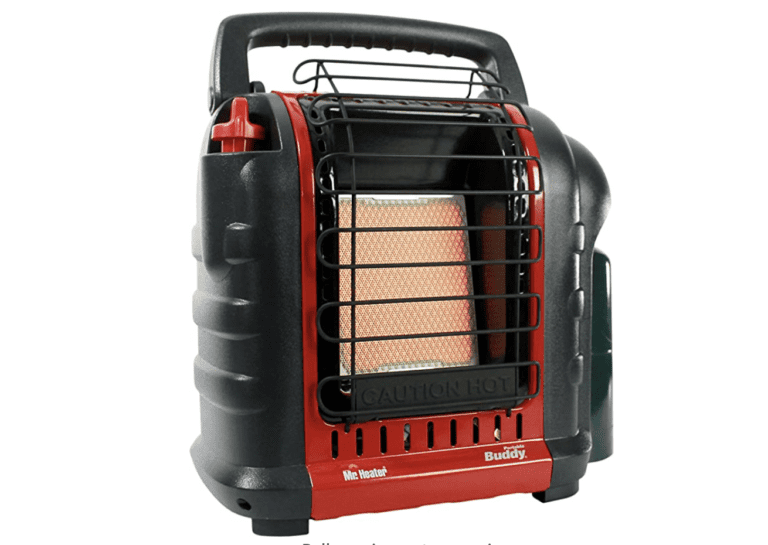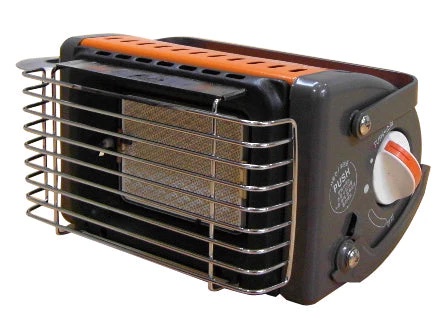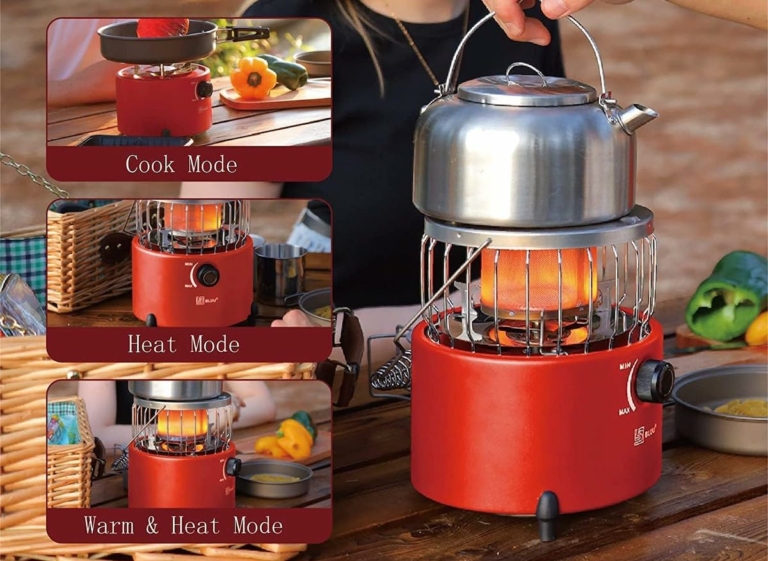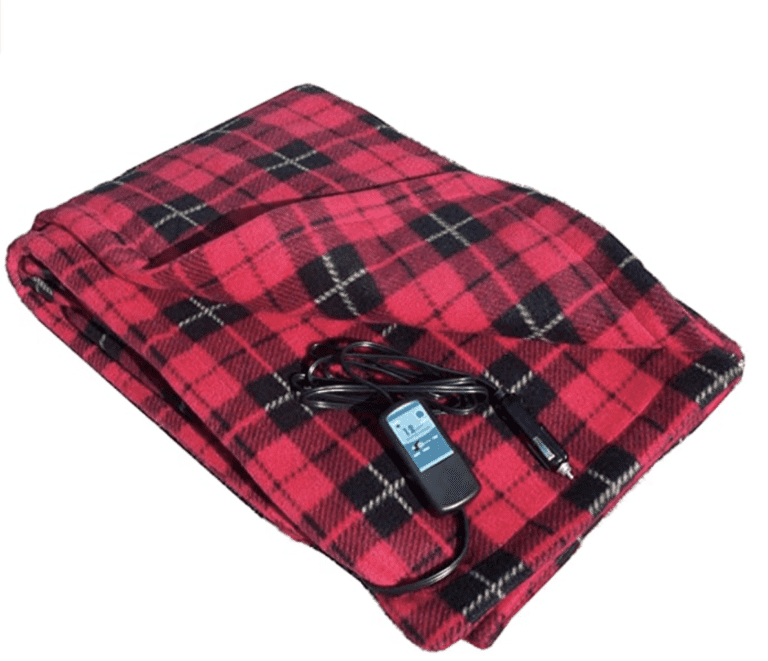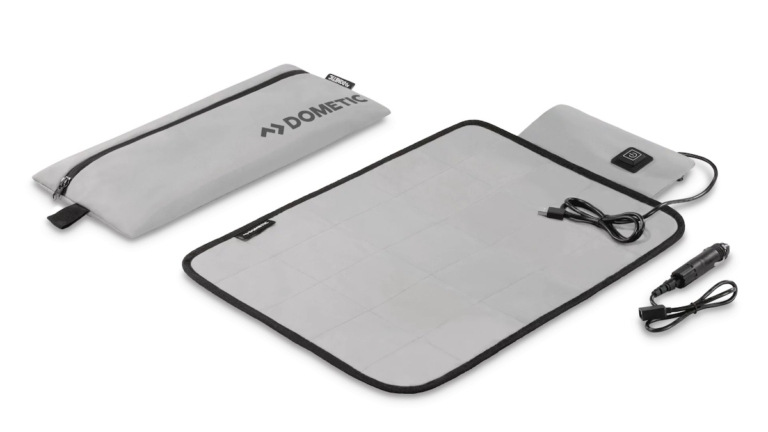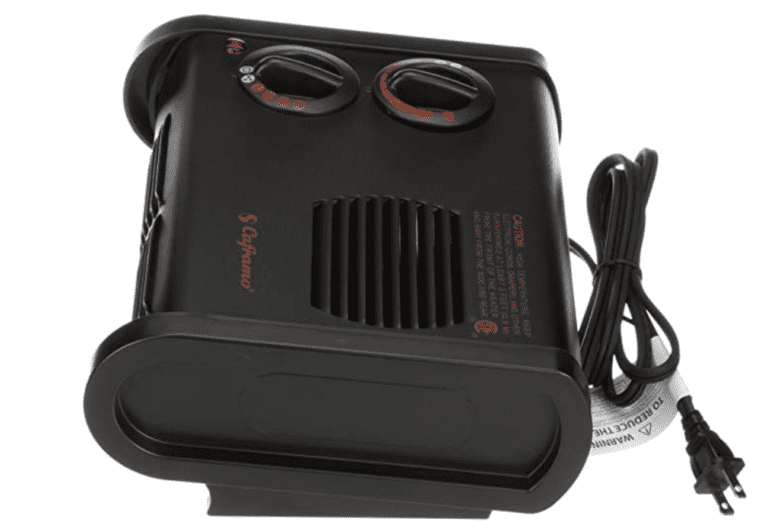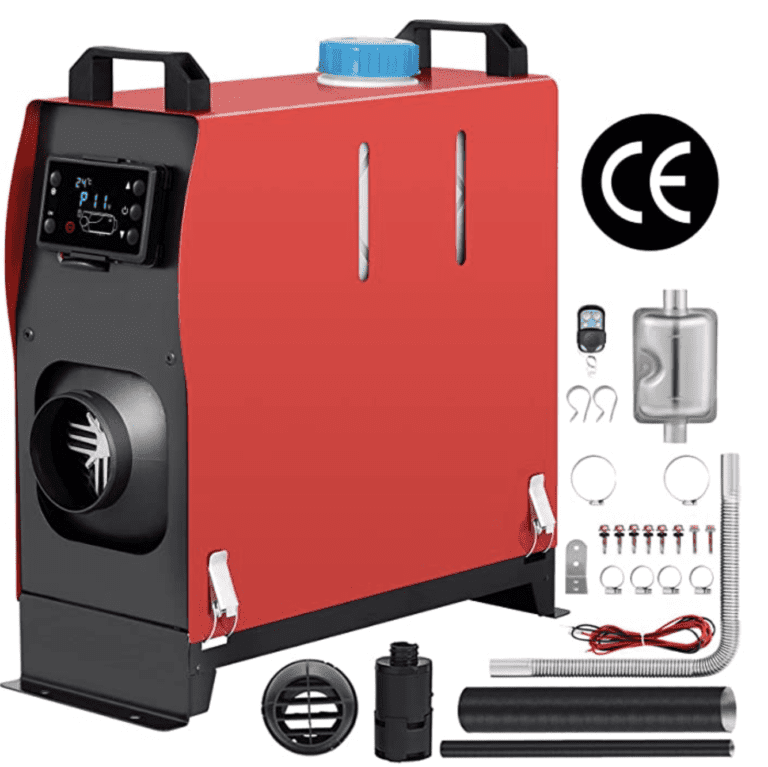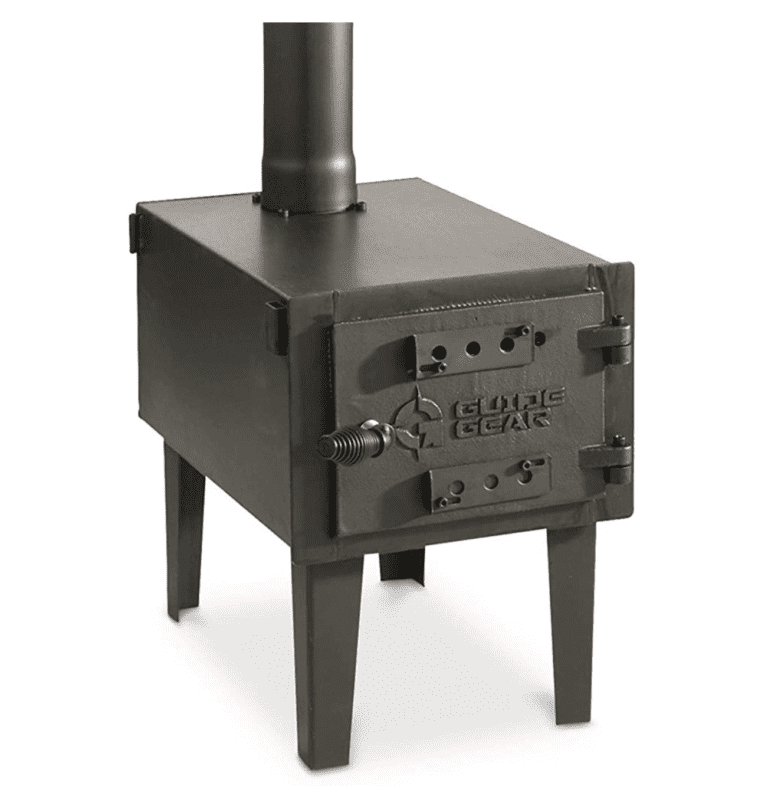Wherever you park, there may come a time when you want (or need) heat in your camper van. Winter van life obviously poses challenges, but even in the middle of summer, you can experience coastal winds, high elevation, or a cold front coming through.
Trust me – I once found myself stuck in a snowstorm at the peak of a mountain pass in Utah near the beginning of Autumn! As I fishtailed my van into a rest stop parking lot, I realized I needed to stay there for the night. Without a portable heater, I used my camp stove to make hot tea and my selk’bag to get me through the night.
If I had a proper camper heater, my night could have been a bit more pleasant. And in the most dire of situations, a camper heater could be the difference between life and death.
But what campervan heating system suits you the best? There are four main types of van heating systems that vary in cost, functionality, efficiency and safety:
2. Catalytic heaters (AKA electric heaters / blankets)
Let’s dive into the best heating method for your campervan.
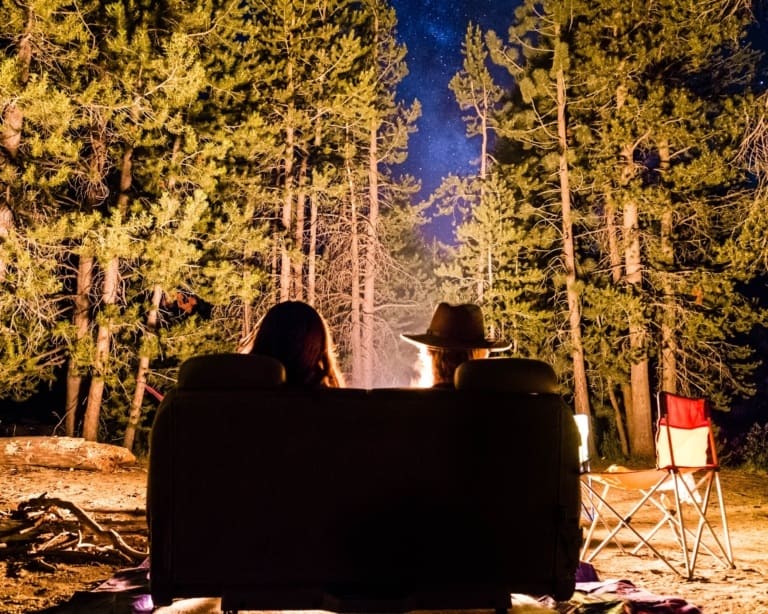
Propane, Electric, Wood, Diesel–Which Heater is Best for You?
The right option for you will depend on how you use your camper van. If your van has electrical hookups and you’re camping with access to a power source (e.g. a state park campground), then electric heaters are a great way to go. But many vanlifers won’t have that option.
Propane heaters are a very popular choice because they are easy to use and they won’t break the bank. But if you have a little more money to put into your camper van, a wood stove or a diesel heater may be an attractive option. Woodstoves actually put out more heat than many expect (and are very cozy), but a diesel heater can heat your space more efficiently. Let’s take a closer look at each of these methods.
Top Camper Heater Picks
Propane Heaters for Camper Vans
Portable propane heaters run on liquid propane, the same stuff that many vanlifers already use to run their stoves and grills. This is a benefit, as you may already have propane at hand. If you don’t, propane is very easy to find and relatively inexpensive to use for heating.
Unlike other heating methods that can take a minute or more to warm up and really kick out some heat, a portable propane heater can start producing heat right away. Thanks to the open flame and consistent supply of propane to keep the flame going, you’ll have instantaneous heat. Some electric options have to heat up, and wood stoves can be difficult to start, similar to a regular fireplace.
There are drawbacks of propane heaters, though. The main drawback is that a big or small propane heater can create carbon monoxide if it isn’t properly ventilated. And less talked about: they also emit large amounts of carbon dioxide. CO2 isn’t harmful, but in large amounts in enclosed spaces, can cause headaches, sleepiness, and what’s referred to as “cabin fever”.
Also, propane heaters can cause condensation in your van, and prolonged exposure to moisture can create mildew.
Pros:
– Inexpensive
– Easy to use
– Propane is easy to find
Cons:
– Risk of carbon monoxide poisoning
– Condensation can occur
My Top Propane Heater Pick
Mr. Buddy Heater
Buddy heaters are one of the most popular portable heaters used by vanlifers. A buddy heater is an open-flame heat source that is inexpensive (currently $90), indoor-safe and runs on 1 lb. propane tanks. The heater can easily heat up a small van or small RV quickly and will automatically turn off if tipped over, the pilot light turns off, or low oxygen levels are detected.
The Buddy heater is powered by propane (no plugin or batteries are necessary). Igniting the pilot light turns it “on”, which you do by opening the propane valve and hitting the big button to create a spark and create the flame.
But you should only use buddy heaters with proper ventilation and a carbon monoxide detector installed. Even though this portable propane heater is marketed as indoor-safe, you can never be too careful. I’ve heard stories of campers accidentally burning down their home on wheels because they left their Buddy heater running unattended…
Kovea Cupid Portable Gas Heater
The incredibly compact Kovea Cupid portable heater is a great option for those who want a heat source that they can easily move around their van or carry around outdoors. This particular unit weighs just 3 pounds (compared to the 10-pound Mr. Buddy heater) and uses a convection heating method.
Reviewers note that despite its small size, the Kovea Cupid heater will generate heat impressively fast and puts out far more heat than the cheap “personal heaters” that have to be aimed right at you in order to actually feel anything. I suspect it’s thanks to the ceramic based heating plate that heats up super fast from the gas canister output. According to reviewers, it will heat a small campervan or small room pretty well.
The downside is that this portable heater can only hold small butane canisters like the ones used for backpacking camp stoves), which means they run out quickly. One reviewer noted she needs to replace the canister every three hours when using it nonstop–that can get expensive fast. Also, this heater doesn’t have tip-over safety protection feature so you must make sure it’s placed on top of a non flammable barrier.
Another potential downside: the Cupid heater may not perform very well in really cold temperatures. Technically, the Cupid heater requires butane as its fuel source and not propane. While butane and propane are both forms of Liquefied Petroleum Gas (LPG) that are clean-burning fuel sources, butane has a higher boiling point than propane, making it less ideal for outdoor use or really cold temps.
BLUU Propane Heater: 2 in 1 Outdoor Stove and Heater
The budget-friendly Bluu 2-in-1 heater can also be used as a camp stove or warming pad for food. This thing is pretty nifty–it weighs less than 3 pounds but can accommodate pans up to 12 inches wide. While this hybrid heater-camp stove is a great choice for the vanlifer on a serious budget, it’s also great for camping, ice fishing, BBQs, hunting, or really any activity where you may want some heat and a stovetop.
That being said, I don’t think I would trust running this propane heater inside my van all night, since its open flame is pretty exposed. Nevermind the fact that running it all night wouldn’t be possible unless I was changing out propane canisters. The brand states, “100g & 230g butane / isobutane / propane fuel canisters of most brands can be nested inside the stove, or to connect with the 1 lb propane cylinder for longer use by an extension hose”.
Similar to the Kovea Cupid heater, the Bluu propane heater uses butane, but can also be used with isobutane or propane, which gives it some nice versatility if you’re in a pinch to buy more fuel canisters with only limited options around.
Electric Heaters for Camper Vans
Electric heaters (AKA catalytic heaters) are a fantastic option for heating your camper van. A catalytic heater can produce heat without an open flame. They plug into regular power outlets and come in a wide variety of shapes and sizes. Those same space heaters that people use in their homes and offices can be used for heating a camper van.
But your van battery won’t be able to run an electric heater for very long because many catalytic heater options require a fairly hefty amount of electricity to operate. This means you either need access to an outside power source such as shore power hookups, or have a really epic portable battery and solar setup that let’s you stay off grid for long periods of time.
For many vanlifers that is a dealbreaker, but never fear, there is another option. Electric blankets that run off of cigarette lighter outlets (AKA auxiliary power outlets) won’t draw so much of your power and can be a great option for keeping you toasty at night.
Pros:
– Very inexpensive
– Widely available
– A range of models and power levels
Cons
– Actual heating units will require an outside power source
– Blankets are the only option without outside power
My Top Electric Heater Picks
Car Cozy 2 - 12V Heated Travel Blanket
The Car Cozy 2 electric blanket plugs into your vehicle’s cigarette lighter outlet and is big enough for two people to use. While this is a super low-maintenance and low-power option for road travelers, it’s probably only ideal for those in really small overlanding rigs. Because if you’re in an RV or campervan, chances are your bed will be in the back and the electric blanket’s cord won’t reach to the front of the rig where the cigarette lighter plug is located (on the dashboard).
But if you use a portable battery (such as the Jackery 240) you could plug into the battery and keep it by your bed. I think an electric blanket is an incredibly handy camper heater option because it’s relatively cheap, safe for indoor use (no risk of deadly gas leaks or open flame), provides quiet operation, and is far more energy efficient than a space heater. If your goal is to just stay warm underneath your blankets while in bed, an electric blanket is the way to go. It obviously won’t heat the whole inside of your van, but you can use it in conjunction with other heat sources for a more energy efficient way to stay warm during the winter months.
Want more blanket choices? Check out my roundup of the coziest travel blankets to cuddle up in this winter season.
Dometic GO Camping Seat Heater
The Dometic GO camping seat heater can be used to heat your camp chair or (for an even better use IMO) used to pre-heat your bed or sleeping bag. This heating pad can provide heat for your tushie or whole body, depending on your needs. Combine this with a heated electric blanket, and you have your whole back and front covered!
Similar to the Car Cozy heated blanket, this heating pad is totally safe to use, relatively inexpensive, super compact and lightweight. It comes with USB-A and 12V car outlet chargers, so even its power charging is versatile. You can use a portable battery or your van itself (via cigarette lighter outlet) to keep it charged.
The Dometic GO heating pad has a low, medium, and high heat mode, and is made of rugged, water-resistant but heat efficient material. The pad has a built-in temperature sensor that cuts off at 130°F (55°C) and an auto shut off feature after it’s been on for 45 minutes.
Caframo True North Heater
The Caframo True North corded electric heater packs a punch, with a slightly higher price tag (~$128) than the electric blanket. It has a built-in adjustable thermostat with anti-freeze setting that will automatically come on at 38F degrees. The Caframo True North heater uses forced air method to help disperse the heat (think of a fan blowing the warm air away from the unit). Unlike the Mr. Buddy heater, the warmth doesn’t just stay by the unit.
That being said, this heater will make more noise than the Mr. Buddy heater due to its fan that helps disperse the warm air.
Diesel Heaters for Camper Vans
Diesel heaters are a great option for heating your van. Diesel is relatively cheap and burns much more efficiently than propane because it’s denser, so it takes less per BTU to heat the same amount. Diesel can be slightly harder to find than propane since it isn’t always available at local grocery stores or gas stations, but since it burns slower, you won’t need to refill as often as you would with propane.
Diesel heaters also produce much lower levels of carbon monoxide than propane heaters, making them a slightly safer option. But typically, heater units can be pricey and more complex to set up than, say, an electric blanket that just needs to be plugged in.
Pros:
– Fuel is cheap and easy to find
– Better job at providing heat
– Easy to control with thermostat and remote
Cons:
– Pricey
– More difficult to install
My Top Diesel Heater Pick
Happybuy 5KW Diesel Air Heater
The Happybuy 5KW diesel heater is specifically designed for RV motorhomes, trailers and campervans. It also uses a forced air system to help disperse warm air throughout your rig without depositing carbon into the environment. This heater also comes with an LCD display and remote control setup that let’s you turn it on from outside your rig, so you can heat up your rig by the time you’re in there. I don’t super recommend using this feature just to be safe, but it’s an option.
Since it has a remote control, you can turn it on and off from your bed–no need to get up!
Wood Stove Heaters for Camper Vans
Wood stoves are small, enclosed fireplaces. They burn cut firewood to heat your camper van. Firewood is relatively cheap to find and easy to use. But installing a properly ventilated wood stove will take a bit more time and money than a propane heater.
Many vanlifers want a wood stove for more than just heat. It sure sounds cozy to curl up with a book and a glass of wine by the fire. But there are also risks that come with having a wood fire in an enclosed space, as the fire will produce carbon monoxide and other potentially hazardous air pollutants, so make sure to properly install your stove.
Pros:
– Easy to use
– Can run all night
– Aesthetically pleasing
– Wood is inexpensive and easy to find
Cons:
– Can be expensive/time-consuming to install
– Must be ventilated properly
– Risk of fire and smoke
My Top Wood Stove Heater Pick
Guide Gear Outdoor Wood Burning Stove
Not only is the Guide Gear stove the most stylish of heating options, it will also impressively heat up a space for how small it is. And unlike a propane or diesel heater, you can keep the stove running all night for an incredibly toasty sleep.
Of course, you still need to make sure ventilation is set up correctly so your rig doesn’t fill with smoke. But since the wood stove is a permanent fixture in your rig, once it’s set up correctly it shouldn’t need to be constantly monitored like a propane or diesel heater needs.
How to Choose a Portable Van Heater
Van size
As you know, the larger the van, the more heat you’ll need. Many heaters will tell you the recommended square footage they will heat.
Budget
A major factor, if not the chief factor for many vanlifers. If you don’t have much money in the bank, you may be looking more at propane heaters and electric blankets. If you have more to spend, you may want to go with a more elaborate build.
Installation Difficulty
If you don’t have any help and aren’t build-savvy, propane heaters and electric options may be your only choice. While many wood-stoves and diesel heaters require more work, they may be easy installations for handy people.
Ventilation
A major issue with any heat source other than electric heat. Whether it’s wood or gas, if you’re burning fuel there will be fumes and/or smoke produced, and those can be deadly. Be sure to follow the manufacturer’s instructions and ventilate your heater properly.
Conclusion
Whether heat for your camper van is a seasonal issue or a year-round priority for you, having a way to heat your van is essential. Whether you choose propane, electric, wood, or diesel, be sure to install it properly and use it safely.
_______________________
Transparency note: please keep in mind that some links in my articles may be affiliate links, to which I may make a small commission at no extra to you, should you book travel or buy a product or service through one of these links. I only recommend products or services created by brands I know and trust.





